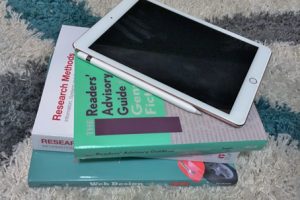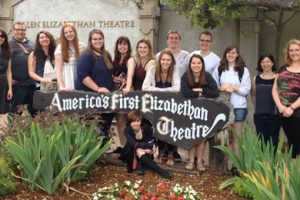Sitting in a living room at three o’clock in the afternoon is a boy staring at page far too close to his face. None of the words can really be registered at this distance, but that’s the point, as his attention is actually on the hanging clock in the other room. This clock is his only solace, as it tells him when his mandatory hour of daily reading is up—a rule created by his tyrannical homeschooling parents (how dare they!). Unfortunately, only 15 minutes has passed, with what feels like 20 years left. He decides, begrudgingly and out of boredom, to actually read the book in his hands. Turning the small tome toward the first page, he begins to read the strange runes he’d been forced to memorize. Two minutes later, he sees, from the corner of his eye, his siblings get up and leave the room, happy to be done with their hour of reading. He quickly glances at the hanging clock and his page number. Hmmm. 20 pages seemed to go by pretty fast. He definitely wants to go play outside, but he just wants to read a little more. Some interesting stuff is happening with the Pevensies and he’s curious to see how things develop, especially as he sees a kindred soul in Lucy.
This boy is now in high school at a cafeteria, and he’s absorbed by the internal narrative of Ender Wiggin. Ender seems to be caught in a web of differing intuitions and ethical norms. His abilities seem undeniable, but that doesn’t seem to help him in the long run when it comes to social dynamics with his peers. The boy knows exactly how that feels. Despite the importance adults put on intelligence, it only seems to isolate those who pursue it to the highest degree. Similar to Ender, he also seems stuck between competing visions of the adults in his life. Where does he reside within these beliefs? How best is he to play his own game? He continues to read in the hopes that maybe he’ll find his own salvation within the novel. He still has to go to classes, but those are mostly just opportunities to put into practice whatever insights he reads here.
This young man is now in college, and there’s a light breeze that nuzzles his cheek while also gently cooling the white chocolate mocha to his right. He’s wired, but not because of the caffeine. Rather, his eye dilation can only be surpassed by his mind’s, as he begins to connect the pieces of his life, pupils locked on Nietzsche’s prophetic proclamations: “No price is too high to pay for the privilege of owning yourself!” The young man’s passion begins to overflow into daily habits. Each day becomes a unique prospect to be shaped by his hand. What he begins to realize is that, ever since he encountered the Pevensies move to the country house, he’s been engaged in a process of looking at the narrative format of reality, as best as he can understand it at any given moment. In reading the explicit imaginary, he’s slowly been growing more aware of the implicit imaginary way in which he constitutes what’s “real.”
There’s a common misconception among many people that there is a clear demarcation between “real” and “imaginary.” However, upon closer inspection of our experience, we see that this isn’t necessarily true. Nonetheless, much of our global pedagogical approach is on training individuals to develop “real-life skills” so as to be productive members of our society. Not only is this a black-and-white view of reality based around “education as job preparation,” but it also limits our potential as individuals and collectives. Humanity exists at a precipice as yet unseen. Namely, we live in a social environment that our evolutionary software (approximately 10,000 years old, mind you) is unequipped to handle, leading to tribalism, violence, bigotry, and the like. How do we update this software? Education. However, an education that sees books as “information depositors” is an education that perpetuates the world as it was.
The aforementioned young man doesn’t grow in his understanding of himself, his reality, and his world through getting the “right” information. Rather, it’s about the context in which it is presented, both physically and systemically. The emotional processing of the unknown strange world outside doesn’t happen without the betrayal of Edmund. The integration of his various needs and drives doesn’t happen without the trials of Ender. The assertion of a foundational self and its creative application in day-to-day life doesn’t happen without Nietzsche’s vitriol. Perhaps we should reimagine education not as a standardized curriculum, but as an imaginary context of exploration, both social and individual. What would humanity literally look like in the wake of this literary process?
 Anthony Quigley
Anthony Quigley
Student Representative, Far Western Region, 2022-2023
Alpha Tau Phi Chapter
University of Oregon, Eugene, OR
Sigma Tau Delta
Sigma Tau Delta, International English Honor Society, was founded in 1924 at Dakota Wesleyan University. The Society strives to
- Confer distinction for high achievement in English language and literature in undergraduate, graduate, and professional studies;
- Provide, through its local chapters, cultural stimulation on college campuses and promote interest in literature and the English language in surrounding communities;
- Foster all aspects of the discipline of English, including literature, language, and writing;
- Promote exemplary character and good fellowship among its members;
- Exhibit high standards of academic excellence; and
- Serve society by fostering literacy.
With over 900 active chapters located in the United States and abroad, there are more than 1,000 Faculty Advisors, and approximately 9,000 members inducted annually.
Sigma Tau Delta also recognizes the accomplishments of professional writers who have contributed to the fields of language and literature.
Sigma Tau Delta accepts submissions to our blog, WORDY by Nature, throughout the year from all membership categories (students, Advisors, and alumni). If you are interested in submitting a blog, please read the Suggested Guidelines on our website to check if your topic is a good fit and to verify your article is correctly formatted. Email any questions and all submissions to: submit@wordybynature.org.






This was an amazing and insightful piece. Thank you for sharing something so deeply personal.